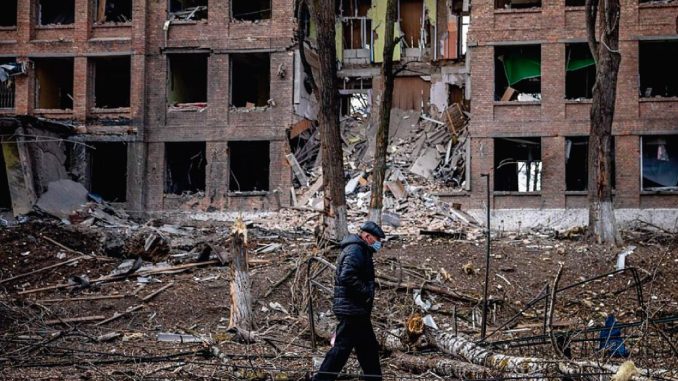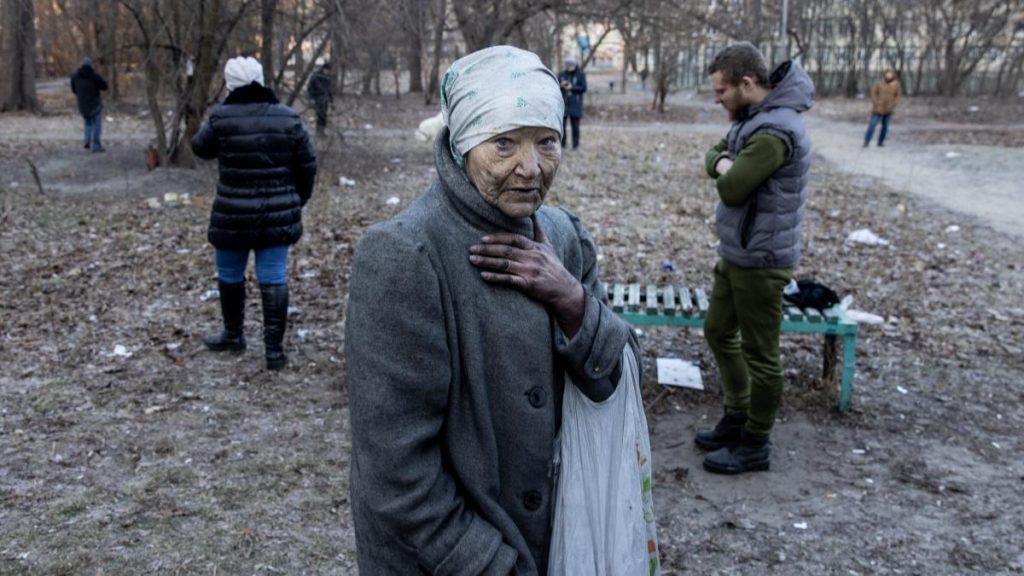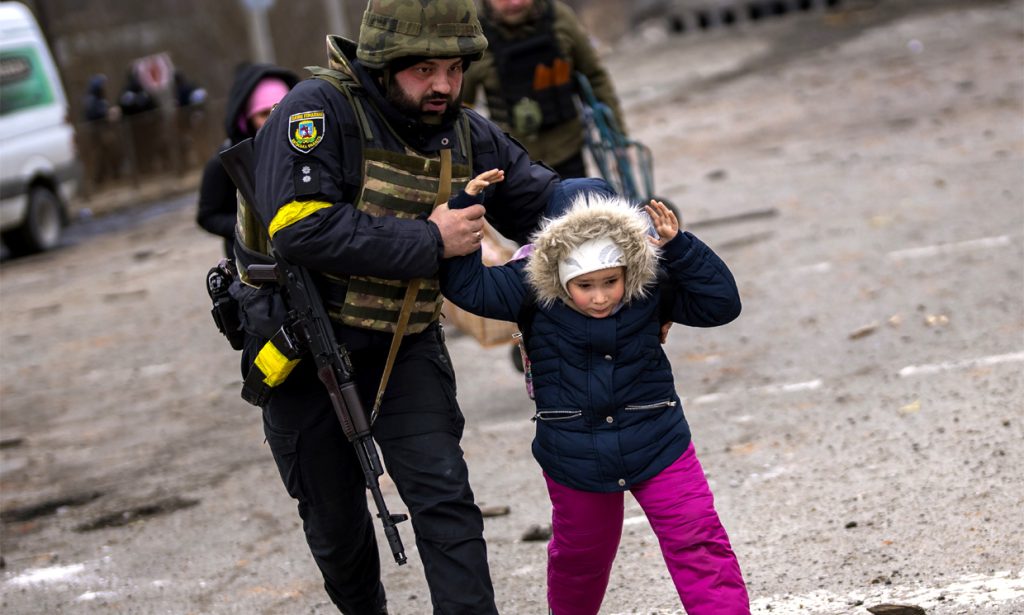
On February 24, 2022 Russia began the invasion of Ukraine and another war broke out in Europe. The Ukrainian people are the most harmed and more than three million refugees result in a serious humanitarian emergency. Because of Putin’s responsibility, the Russian economy is sinking and a social disaster is looming. The world’s granaries are at risk and the spread of hunger appears as a serious threat. The cost of energy is skyrocketing, generating inflation and wage devaluation. War and its consequences generate mobilizations that alarm those in power. In three years there has been a world economic crisis, pandemic and war, all under the retrograde sign of imperialist capitalism. We say: No to war and that the capitalists pay for the crisis, on the road to socialism for which we built the International Socialist League and its national sections.
By Rubén Tzanoff
The war between the Russian imperialist ambitions headed by Vladimir Putin and the expansionism of Western imperialism of NATO, the US and the EU, has unpredictable consequences. Putin aspired to achieve a quick triumph in a lightning operation, but he was met with resistance, the population did not welcome the tanks as “saviors” but as invaders.
The Ukrainian people are the most harmed
As for Ukraine, a Focus Economics analysis notes that “massive damage to infrastructure, large migration flows and total paralysis of activity will cause between 40%-60% contraction by 2022”. Inflation would reach 50% and interest rates 30%. The economic deterioration predates the war, it is marked by a corrupt management in the government of Volodymir Zelenski and the dominance of oligarchic interests. The paralyzation of activities as a result of the war and the mobilization are placing the social consequences mainly on the backs of the workers and the people who are making a heroic effort in conditions of economic and military inferiority.


There is a serious humanitarian emergency in progress
The attacks on cities, hospitals and the civilian population have already caused more than three million people to leave their homes, displaced to other regions of Ukraine or to other countries. The governments of the European imperialist countries act cynically, they fill their mouths with humanitarian phrases, but the truth is that they receive limited quantities of Ukrainians and they did not put into practice the indispensable mechanisms for a massive reception. In Spain, the authorities do not even know how many refugees have arrived in the country. The signs of solidarity come mainly from the population in different countries who offer their homes and from some trade unions which collect foodstuffs.
The Russian economy is in decline
The sanctions for Putin’s regime have so far caused an estimated loss of 30 billion dollars of GDP, with a forecast contraction of the economy ranging between 9% and 15% for the current year. Gas exports are not affected by the sanctions, but will contract by at least 5% due to the impossibility of selling gas through the Black Sea ports. Default on foreign debt is a latent possibility.
In Europe, Russian oligarchs have had some luxurious yachts confiscated, but they will not suffer too much. They have been privileged billionaires for years, favored by the proximity to power of Putin’s regime. The costs of the expansionist and fratricidal war will fall on other backs.
The bill for the invasion will fall on the workers and the people
The withdrawal of many companies has already led to massive layoffs. The 40% fall in the value of the ruble is a blow to the pockets of popular households. The managing director of the plundering IMF, Kristalina Georgieva, assessed: “Russia is entering a “deep recession and the collapse of the ruble is causing an increase in inflation and seriously eroding the purchasing power of the Russian population”. The person responsible for this situation is Putin, who is also persecuting, repressing and imprisoning those who protest against his policies.

In Russia, anti-war mobilizations began on the very day of the invasion of Ukraine. At the same time, demands have begun to arise in the workers’ movement, as a result of the worsening of living conditions. It is essential that the mobilizations develop and spread throughout the Russian Federation, in order to achieve a powerful No War Movement, confronting the government and the regime, demanding the end of the invasion and the fulfillment of social rights for the great majority.
There have been mobilizations in Moscow, St. Petersburg and other cities. The strikes, like the one that occurred spontaneously at the Gemont company (Nizhnekamsk) in the face of the delayed payment of wages and the devaluation of the field, mark the road to follow and to deepen. With each day of combat, with each bomb that explodes in Ukraine, the effects of the shock wave are felt more intensely and further away from the epicenter located in Eastern Europe. The consequences have begun to be felt. And they may get worse.
The granaries in danger
The Russian Federation is the world’s largest wheat exporter and Ukraine is the fifth. Between them, they provide 19% of barley supply, 14% of wheat and 4% of maize, or one third of world grain exports. They are also the main suppliers of rapeseed and account for half of the world sunflower oil market. Twenty-five percent of European fertilizers come from Russia, the world’s largest producer. It is not known whether Ukrainian farmers will be able to harvest crops, Black Sea ports are closed and warehouses could be destroyed.
Hunger on the table
Adding to the food shortages is the rising prices of basic commodities for mass consumption. “The FAO food index has risen by 50% since mid-2020 to now reach an all-time high. Wheat has become 50% more expensive in two weeks, the highest levels in 14 years.” “At this rate, we’re not going to make it to July if we don’t find another supplier. It is inevitable that the end consumer will have to bear this cost overrun, there are no options.” On top of that, speculators are taking advantage to enrich themselves, as they did during the pandemic with private healthcare, basic supplies and vaccines.
No guaranteed alternative supply
Australia, India and parts of Europe can provide extra wheat, but not enough to make up for the 14 million ton shortfall. Wheat stocks are running low in Canada and a question mark looms. Will the U.S. and Argentina limit exports to ensure domestic consumption? Egypt, the world’s largest wheat importer, buys 80% of its grain from Ukraine and Russia. Lebanon has at most a month’s supply. Rising prices exacerbate social contradictions and poverty in the country. Tunisia imports half of its wheat from Ukraine and Yemen is on the brink of famine.
Energy skyrocketing
The other element ringing all the alarm bells is the rising cost of fossil fuels, leading to widespread increases in a cascading effect. In Europe, electricity bills have been rising without limit for some time now, in some countries reaching historic peaks. With the war, the price of gas arriving via Russia, mainly to Germany, has risen, as well as the price of gasoline.
For the first time in decades, inflation has once again taken hold in the EU. It is hitting the great majorities in Germany, France, Spain and other countries. It is no coincidence that in France there have been trade union demands since January against inflation and the reduction of purchasing power. That is why, at the Versailles summit held last week by the EU, they agreed to try to “limit the contagion effect of the rise in gas prices on electricity prices”. The Club is on high alert because of the tensions that are building up and could lead to struggles by European and world workers.
They fear protests
“Your Majesty, the people are rebelling, there is no bread,” they shouted to Marie Antoinette before France’s Ancien Régime fell under the weight of the Revolution at the end of the 18th century. Today’s economic history offers similar ingredients, with epilogues yet to be written.” So begins a note in the newspaper La Vanguardia, dated 13/03/2022 warning about what may happen.
The researcher of CIDOB (Barcelona Centre for International Affairs), Eduard Soler, recalled that “more than a decade ago the increase in the price of bread was one of the factors that triggered the protest movements of the Arab Spring in 2010 and 2011”.
The EU’s arguments for “decoupling” gas and electricity prices are aimed at avoiding eventual explosive social situations in the countries that make up the EU due to the succession of continued capitalist catastrophes.
The crisis of the capitalist economy as the main base
In January 2019 the IMF and the World Bank began to talk about the existence of bad economic indicators and an uncertain outlook. During 2019 they adjusted the 2020-2021 GDP growth forecasts downward 3 times. In the face of the enormous deterioration in the living conditions of millions of people, a new revolutionary upswing shook the world.
Pandemic and war without any stable solution
In March 2020, the WHO announced that the cases of coronavirus disease constituted a pandemic. More than six million people died. Extreme poverty stands at over 150 million people. Inequality spread across the planet: while a handful of privileged people accumulated huge gains, the vast majority of humanity accumulated ailments. Many countries and continents have very limited access to vaccination, as a result of the criminal voracity of laboratory profits. And now the war implies a new addition, while Covid-19 continues to develop in large regions of the world.
No to war
On all continents mobilizations against the war are taking place. The parties that make up the International Socialist League intervene in this process in unity of action with different sectors, promoting their own actions and, fundamentally, supporting our comrades of the Ukrainian Socialist League who are resisting the invasion together with their people. With a principled policy, based on raising the issue of Russian imperialism out of Ukraine, NATO and the U.S. out of Eastern Europe, in support of the Ukrainian resistance. The ISL has been expressing its views in statements, actions and in the words of the Ukrainian comrades themselves from Kiev.
For a dignified humanitarian admission
Millions of people flee from war to neighboring countries while the EU authorities erect the walls of “fortress Europe”. It is a retrograde and anti-human construction that prevents those fleeing wars and famine in Africa from entering the Old Continent. As a result, thousands of people die at sea every year or are sent back to the horror from which they came. We must demand that European governments provide all the resources necessary for a dignified admission. Today to Ukrainian refugees, always to people in need, no matter which continent they come from.
Let the capitalists pay for the crisis
We must not let the Russian and Western imperialists embark the workers’ movement in their war adventures and patriotic feelings. Campism advocated by the reformist currents is a trap to be avoided. Nor should we give in to the workers making “more efforts” to solve expansionist adventures. Mobilization and strikes are indispensable so that the governments do not unload the costs of the war and the economic crisis on the backs of the great majorities.
Capitalism leads to barbarism
From the occurrence of the crisis of the capitalist economy, passing through the pandemic until the outbreak of the war, three years have not yet passed. The situations were different, of an economic, health and war nature. However, there is a common denominator that unites them: imperialist capitalism. Expansionism, the ambitions of profit, of obtaining new markets and extending political influence, are at the expense of social suffering of the great popular majorities. These are not isolated and unconnected facts. It is the result of the domination of a savage and murderous world system of exploitation and oppression.
There is no solution without socialism
We must defeat imperialist capitalism so that it does not lead humanity towards barbarism and build socialism. A system without exploiters and oppressors. That unites the working class of the different countries instead of confronting them. That puts life before profit. And that distances itself from the Stalinist bureaucratism that stained the banners of socialism. To achieve this it is fundamental to build an international socialist and revolutionary organization; strong and integrated by parties spread throughout the world. This is the task that the International Socialist League develops daily.








